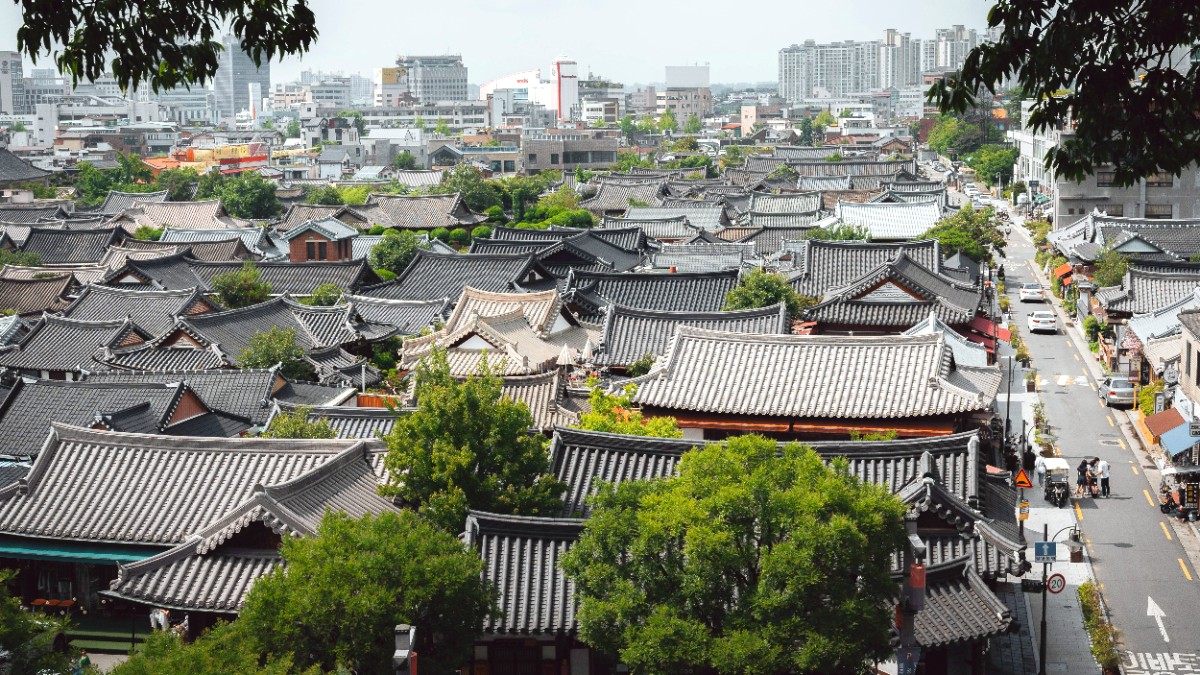
Jeollabuk Do, South Korea
The Jeonju Hanok Village, the city's crown jewel, is a living museum comprising over 800 traditional Korean Hanok houses. Many of these structures date back to the Joseon Dynasty, meticulously preserved to showcase traditional architecture and lifestyle.
The village represents cultural preservation, linking to Korea's past. Its design reflects centuries of architectural wisdom, with curved tiled roofs, Ondol (underfloor heating), and wooden frameworks. It remains a powerful symbol of heritage.
Consider purchasing a Hanji fan as an authentic souvenir, or use a Korean-English dictionary for deeper exploration.
Houses the portrait of King Taejo, founder of Joseon Dynasty. A candidate for UNESCO World Heritage, it includes a royal portrait museum and tranquil bamboo forest. (Adults ₩3,000 fee).
One of Jeonju's oldest and largest traditional markets, it reflects the daily life and culinary traditions of the community. Its night market offers street food.
Dedicated to traditional Korean paper, exploring its history, intricate production process, and diverse artistic uses, often with hands-on experiences.
A hub for cultural programs and experiences, promoting traditional Korean arts and customs through workshops and demonstrations.
Dedicated to author Choi Myeong-hee, offering insight into traditional Korean life and culture through her acclaimed novel 'Honbul'.
Jeonju, while celebrated for its urban heritage, also presents access to natural beauty, from botanical gardens to provincial parks.
A botanical garden managed by the Korea Forest Service. Features various themed gardens and walking paths, offering a pleasant environment.
A provincial park centered around Moaksan mountain, with various hiking trails from easy walks to challenging ascents.
A large urban park centered around a natural pond. Famous for stunning lotus flowers in summer (July-August) and a musical fountain.
Beyond the well-known sites, Jeonju holds several unique spots that offer distinct perspectives and experiences, often with fewer crowds.
A colorful hillside village next to Hanok Village. Ideal for unique photos and an artistic vibe. Explore cafes with views.
Urban park with a natural pond. Famous for lotus flowers in summer and a musical fountain. A peaceful escape.
Museum dedicated to author Choi Myeong-hee ('Honbul'). Offers insights into Korean literature and culture.
One of Korea's oldest Romanesque-Byzantine churches, standing on a site of early Catholic martyrdoms.
A hub for cultural programs and experiences, promoting traditional Korean arts and customs through workshops.
Main venue for traditional Korean music (Pansori) and other cultural performances. Check their schedule for live shows.
A colorful hillside village offering unique photo spots and an artistic vibe, located near Hanok Village.
An urban park known for its stunning lotus flowers in summer and a musical fountain show.
A museum dedicated to the acclaimed author Choi Myeong-hee, providing insights into Korean literature.
Pre-booking tickets for popular attractions is advisable, especially during peak season.
Dress respectfully when visiting religious or sacred sites like Jeondong Catholic Church or temples.
Remove shoes before entering traditional Hanok buildings or temple halls. Be mindful of photography rules, especially inside museums or sacred areas. Wear comfortable footwear for extensive walking, especially in Hanok Village.
Optimize your visits with these helpful tips for various attractions.
Navigate Jeonju effectively to maximize your sightseeing and exploration.
Jeonju strives for accessibility, but some historical areas may pose challenges.
Access comprehensive resources for a smooth and informative visit.
Jeonju's rich history as the ancestral home of the Joseon Dynasty and its continued efforts in cultural preservation are evident throughout the city's attractions.
Many sites directly relate to the founding of the Joseon Dynasty and its royal family.
The city actively preserves traditional architecture, crafts, and performing arts.
Sites like Jeonju Hyanggyo illustrate the deep influence of Confucianism on Korean society.
For a understanding, consider guided tours that explore historical contexts and local stories.
Book a tour via GetYourGuideJeonju's well-marked attractions make self-guided walking tours easy and enjoyable.
Rent a traditional Korean Hanbok in the Hanok Village for unique photo opportunities.
Find Hanbok rentalsExperience the lively Nambu Market Night Market on weekends for street food and atmosphere.
Participate in traditional tea ceremonies or Hanji paper crafting workshops for hands-on learning.
Explore Jeonju's history and traditional arts at its dedicated museums.
Discover the serene natural beauty surrounding Jeonju, offering a peaceful respite.
Consider a GetYourGuide booking for tickets to attractions or guided tours.
Check seasonal operating hours for museums and attractions, as these can vary.
Jeonju is a city where tradition meets modern life, offering a distinctive blend of historical charm, culinary excellence, and local activities.
Explore the roots of the Joseon Dynasty and the city's role in Korean history.
Savor the flavors of Jeonju, known as Korea's food capital.
Engage directly with Korean traditions through various hands-on activities.
These activities offer a tangible connection to local customs.
Discover the serene landscapes and green spaces surrounding the city.
These parks provide a tranquil escape from the urban environment.
Experience the local life and culinary scene at Jeonju's bustling markets.
Markets offer a dynamic glimpse into daily Jeonju life.
Access up-to-date information on events, attractions, and practical advice for visitors.
Consider hiring local guides for personalized insights into Jeonju's rich history and culture.
Utilize apps like Naver Map or KakaoMap for efficient navigation around the city.